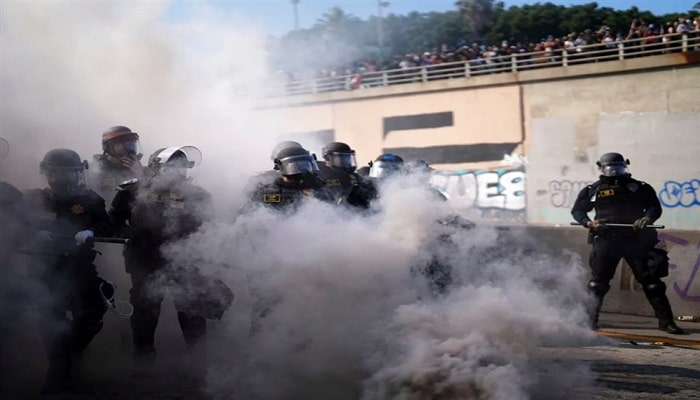PNN – US President Donald Trump’s order to deploy 2,000 National Guard troops and 700 Marines to suppress protests in Los Angeles has been met with widespread reactions, and discussions have escalated about whether he broke the law by issuing this order.
Donald Trump’s move to deploy National Guard and Marines to Los Angeles to confront protesters against immigration policies has been met with widespread criticism from the very beginning.
The decision, made in response to protests over the massive immigration detention operations by Immigration and Customs Enforcement (ICE) in June 2025, has been criticized not only for its potential violation of federal law but also for its negative consequences for democracy and social cohesion.
Read more:
Swedish activist on the “Madeleine” ship: We were kidnapped by Israel in international waters
The illegality of the action
Trump has invoked Title 10 of the United States Constitution, which allows the president to deploy the National Guard in certain circumstances, such as “insurrection” or “obstruction of the execution of federal laws,” to deploy 2,000 National Guard troops and 700 Marines to Los Angeles.
Hina Shamsi, director of the National Security Project at the American Civil Liberties Union (ACLU), described the move as a “dangerous abuse of power” and said: This escalating response not only poses a legal and moral risk to military forces, but also increases the likelihood of harm and danger to civilians.
He stressed that military forces, including the Marines, are not trained to police civilians and that this action “undermines the fundamental democratic principles of not using the military to police civilians.”
Additionally, the Posse Comitatus Act of 1878 prohibits the use of federal military forces to enforce domestic laws, except as expressly authorized by the Insurrection Act.
Trump has not yet invoked the law, instead invoking “general presidential powers,” which legal experts such as Elizabeth Guiten of the Brennan Center for Justice have called “unprecedented” and “lacking a solid legal basis.” Guiten said, Trump’s stated rationale for this deployment seems fragile, even contrived.
The reaction of congressmen
Representatives from Congress have also had mixed reactions to the move. Representative Nanette Barragan, a Democrat from California’s Paramount district, told CNN: Bringing the National Guard into the community will only escalate the situation. People are protesting out of anger at the situation, and we need to remind them to protest peacefully. He also noted that the use of tear gas and rubber bullets by Immigration and Customs Enforcement officers has led to an escalation of the clashes.
Senator Bernie Sanders, an independent senator from Vermont, called the move a sign of the country’s “rapid move toward authoritarianism,” stating: My understanding is that the Governor of California and the Mayor of Los Angeles did not request the National Guard, but he thinks he has the right to do whatever he wants.
These statements reflect the deep political divide in the response to this action. The deployment of military forces in Los Angeles has had several negative consequences for American politics and society. First, the action has exacerbated political tensions between the federal government and local Democratic officials.
Los Angeles Mayor Karen Bass described the deployment of these forces as “a deliberate attempt to create chaos and disorder in the city,” saying: These attacks and the federalization of forces in Los Angeles are a deliberate attempt to create chaos. These tensions could disrupt cooperation between different levels of government and undermine public trust in institutions.
Reports indicate that the use of tear gas, flashbang grenades, and rubber bullets against protesters, particularly in the Paramount and Little Tokyo areas, has led to widespread arrests and increased tensions.
Third, this move is seen as part of Trump’s broader strategy to garner political support through immigration issues. According to a June 2025 CBS poll, while a majority support Trump’s immigration goals, 56 percent view his approach as wrong. This reflects a polarization of society on immigration policies and the risk of deepening social divisions.

